Balingen
Balingen (German pronunciation: [ˈbaːlɪŋən] ⓘ; Swabian: Balenga) is a town in Baden-Württemberg, Germany, capital of the district of Zollernalbkreis. It is located near the Swabian Jura, approx. 35 km to the south of Tübingen, 35 km northeast of Villingen-Schwenningen, and 70 km south southwest of Stuttgart.
Balingen | |
|---|---|
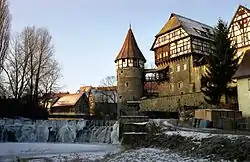 Zollernschloss in Balingen | |
 Coat of arms | |
Location of Balingen within Zollernalbkreis district 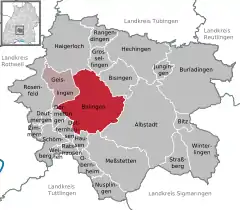 | |
 Balingen 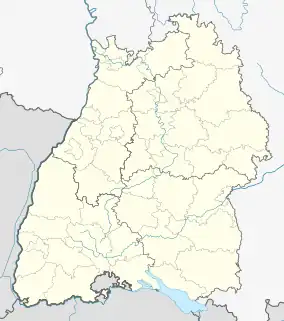 Balingen | |
| Coordinates: 48°16′23″N 08°51′02″E | |
| Country | Germany |
| State | Baden-Württemberg |
| Admin. region | Tübingen |
| District | Zollernalbkreis |
| Government | |
| • Mayor (2015–23) | Helmut Reitemann[1] (CDU) |
| Area | |
| • Total | 90.34 km2 (34.88 sq mi) |
| Elevation | 517 m (1,696 ft) |
| Population (2021-12-31)[2] | |
| • Total | 34,604 |
| • Density | 380/km2 (990/sq mi) |
| Time zone | UTC+01:00 (CET) |
| • Summer (DST) | UTC+02:00 (CEST) |
| Postal codes | 72301–72336 |
| Dialling codes | 07433 |
| Vehicle registration | BL |
| Website | www.balingen.de |
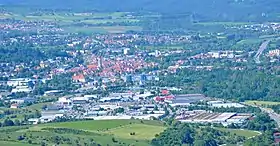
It is home to the Bizerba and Ideal companies.
History
Balingen is first mentioned in 863. Initially a possession of the lords of Haigerloch, in 1162 it was acquired by the count of Hohenberg. In the 13th century it received the title of city from Friedrich der Erlauchte, it was largely rebuilt on the left bank of the river Eyach.
In 1403 it was sold to the County of Württemberg, whose chancellor maintained a residence there until the 18th century.
Balingen became part of the unified Germany in 1870.
Main sights
The city was destroyed by a fire in 1809, from which only the Protestant church, the castle and a few other edifices escaped. The Protestant church's construction finished in 1541; it has a characteristic sundial in the apse.
The castle was reconstructed in 1935.
Sulfor spring
In Balingen there is the enclosed, publicly accessible sulfur spring, whose water is said to have healing powers and support the immune system.[3] As with the medicinal springs in Bad Sebastiansweiler, the spring is made up of dissolved, sulfur-containing sodium hydrogen carbonate (Na-HCO3) from the rock (Black Jura).[4] When the rock containing pyrites (pyrite) is weathered, the oxidation of the pyrite with subsequent bacterial reduction of the sulfate ion produces hydrogen sulfide (H2S). It gives the mineral water the smell of rotten eggs. It contains dissolved substances and hydrogen sulfide. Visitors who regularly drink from it should note that the daily intake of hydrogen sulfide does not exceed the limit of 100 mg.
Nickname
World Capital
Balingen is nicknamed "Waagenstadt", the metropolis of scales. The father Philipp Matthäus Hahn behind the original idea.[5][6][7]
Frommern is nicknamed "Möbelstadt", the metropolis of furniture in the time of Wirtschaftswunder. In Frommern a line of high polished industrial production ( fine veneered wood) take up the ideas of the royal Hofebenist. In the Haus der Volkskunstof the Schwäbischer Albverein the traditional Himmelbett is use as a hotel bed.[8][9]
Notable people
- Gregor Reisch (1470–1525), university teacher and monk, representative of the philosophical school of the late scholastic realists
- Joseph Weiß (c. 1487–1565), also Joseph White painter of Balingen and possibly the Master of Meßkirch , painter of the Renaissance
- Marx Weiß (c. 1518–1580), the Younger, also Marx White from Balingen , painter of Late Gothic
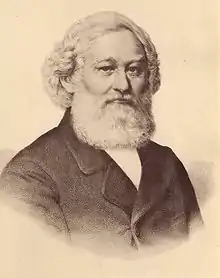
- Johann Tobias Beck (1804–1878), Protestant theologian
- Heinrich Lang (1826–1876), theologian
- Martin Haug (1827–1876), orientalist
- Robert Wahl (1882–1955), entrepreneur and local politicians
- Heinrich Haasis (born 1945), mayor, Member of Parliament, President of the German Savings Bank Association (2006–2012)
- Joachim Schmid (born 1955), painter
- Martin Schaudt (born 1958), dressage rider
- Michael Hennrich (born 1965), politician (CDU), Member of Parliament
- Christoph Sieber (born 1970), comedian
- Kathrin Lang (born 1986), biathlete
- Frank Lehmann (born 1989), soccer goalkeeper
- Pascal Bodmer (born 1991), ski jumper
- Florian Kath (born 1994), football player
Personalities who have worked locally
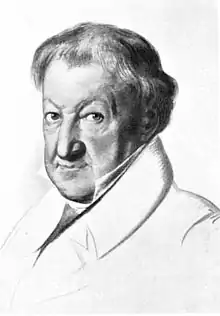
- Johann Murer, a.k.a. Karsthans[10] (1490–1525), Lutherean priest, arrested at the Church of Balingen, was a prisoner in the tower of Balingen[11]
- Karl Friedrich Reinhard (1761–1837), French diplomat, statesman and writer of German origin, grew partly up in Balingen
- Andreas Bizer (1839–1914), mechanic and industrialist, co-founder of Bizerba
Geography
Climate
Using the 0 °C isotherm, Balingen has a humid continental climate (Köppen: Dfb).
| Climate data for Balingen, Baden-Württemberg (2005—2015) | |||||||||||||
|---|---|---|---|---|---|---|---|---|---|---|---|---|---|
| Month | Jan | Feb | Mar | Apr | May | Jun | Jul | Aug | Sep | Oct | Nov | Dec | Year |
| Average high °C (°F) | 2.0 (35.6) |
2.0 (35.6) |
7.0 (44.6) |
12.0 (53.6) |
16.0 (60.8) |
19.0 (66.2) |
21.0 (69.8) |
20.0 (68.0) |
16.0 (60.8) |
12.0 (53.6) |
7.0 (44.6) |
3.0 (37.4) |
11.4 (52.6) |
| Daily mean °C (°F) | −0.5 (31.1) |
−1.0 (30.2) |
3.0 (37.4) |
8.0 (46.4) |
11.5 (52.7) |
14.5 (58.1) |
16.5 (61.7) |
15.5 (59.9) |
12.0 (53.6) |
8.5 (47.3) |
4.0 (39.2) |
0.5 (32.9) |
7.7 (45.9) |
| Average low °C (°F) | −3.0 (26.6) |
−4.0 (24.8) |
−1.0 (30.2) |
4.0 (39.2) |
7.0 (44.6) |
10.0 (50.0) |
12.0 (53.6) |
11.0 (51.8) |
8.0 (46.4) |
5.0 (41.0) |
1.0 (33.8) |
−2.0 (28.4) |
4.0 (39.2) |
| Average precipitation mm (inches) | 42.8 (1.69) |
41.5 (1.63) |
47.0 (1.85) |
38.3 (1.51) |
78.5 (3.09) |
104.7 (4.12) |
129.7 (5.11) |
112.0 (4.41) |
56.4 (2.22) |
47.2 (1.86) |
42.8 (1.69) |
59.6 (2.35) |
800.5 (31.53) |
| Source: timeanddate.com[12] | |||||||||||||
Natural Sport
References
- Aktuelle Wahlergebnisse, Staatsanzeiger, accessed 15 September 2021.
- "Bevölkerung nach Nationalität und Geschlecht am 31. Dezember 2021" [Population by nationality and sex as of December 31, 2021] (CSV) (in German). Statistisches Landesamt Baden-Württemberg. June 2022.
- Sulfor
- Sebastiansweiler
- Waahenbai in german
- Symbol in german
- Wiegetechnik in german
- film in swabian german
- Kultur in german
- Karsthans Täbingen, täbingen.de, retrieved 4 March 2018.
- Werner-Ulrich Deetjen (1985), 700 Jahre Stadt Ebingen – Geschichte in Bildern Vorträge zur Geschichte: Das Reich Gottes zu Ebingen – Gedanken zu seiner Geschichte und Eigenart (in German), Albstadt: Druck und Verlagshaus Daniel Balingen
- "Climate & Weather Averages in Balingen, Baden-Württemberg, Germany". Retrieved 2020-06-04.
- "Städtepartnerschaft Balingen – Royan". balingen.de (in German). Balingen. Archived from the original on 2021-06-03. Retrieved 2021-02-04.
- Trail
- Outdoor